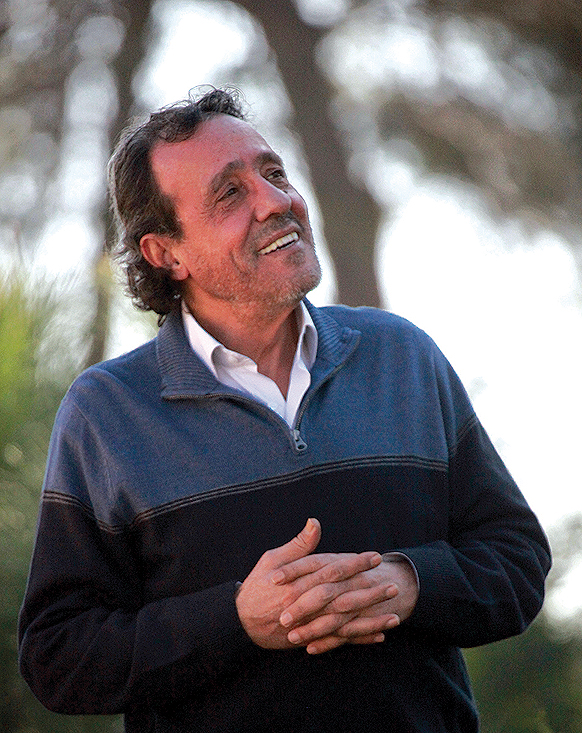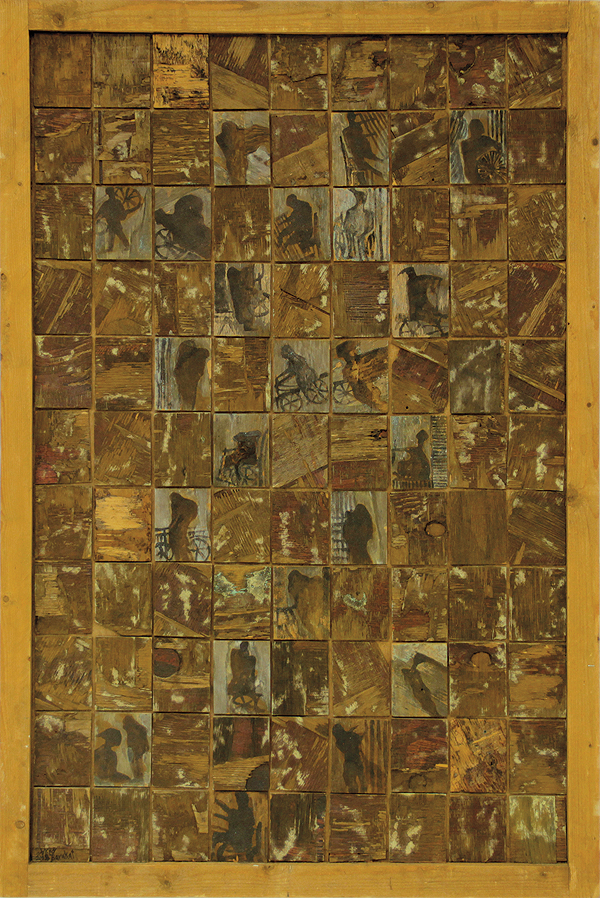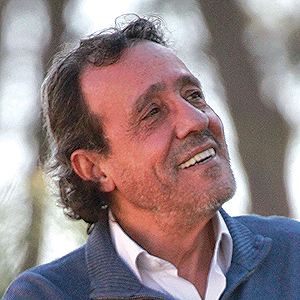
Palestinian poet, novelist, and editor Ghassan Zaqtan writes mainly in Arabic, but his work has been translated into English, French, Italian, Norwegian, and other languages. Born in Beit Jala, near Bethlehem, he has lived in Jordan, Beirut, Damascus, and Tunis.
Zaqtan was editor of El-Bayader, the Palestine Liberation Organization’s literary magazine, and of the poetry journal Al-Shoua’ra; he has served as director general of the Literature and Publishing Department of the Palestinian Ministry of Culture and is a founding director of the House of Poetry in Ramallah. Zaqtan is a member of the executive board of the Mahmoud Darwish Foundation and writes a weekly column in the literary pages of Al-Ayyam newspaper. He lives in Ramallah.

Zaqtan is the recipient of numerous awards, among them the Mahmoud Darwish Award 2016; in 2013, his poetry collection Like a Straw Bird It Follows Me, translated by poet Fady Joudah, received the Canadian Griffin Poetry Prize. Zaqtan was among the short-listed nominees for the University of Oklahoma-sponsored Neustadt International Prize for Literature in both 2005 and 2014, and for the Sheikh Zayid Literature Prize in 2015.
In recognition of his achievement and contribution to Arabic and Palestinian literature, Ghassan Zaqtan was awarded the National Medal of Honor by the Palestinian president in June 2013.
Describing Zaqtan as “a lyricist with strong narrative impulse,” poet and translator Fady Joudah said of his work, “In his poems he sketches or carves psychological portraits that surpass the finalities and categories of consumed or consumerist analysis.” Griffin Poetry Prize jurist Wang Ping commented: “What does poetry do? Nothing and everything, like air, water, soil, like birds, fish, trees, like love, spirit, our daily words … It lives with us, in and outside us, everywhere, all the time, and yet, we are too often oblivious of this gift. It’s a poet’s job to bring this gift out and back, this gift that makes us human again. And Mr. Zaqtan has done it.”
A Picture of the House in Beit Jala
He has to return to shut that window,
it isn’t entirely clear
whether this is what he must do,
things are no longer clear
since he has lost them,
and it seems a hole somewhere within him
has opened up
Closing up the cracks has exhausted him
mending the fences
wiping the glass
cleaning the edges
and watching the dust that seems, since he has lost the things,
to lure his memories into hoax and ruse.
And from here his childhood appears as if it were a trick!
inspecting the doors has fully exhausted him
the window latches
the condition of the plants
and wiping the dust
that has not ceased flowing
into the rooms, on the beds, sheets, pots
and on the picture frames on the walls
Since he has lost them he stays with friends
who become fewer
sleeps in their beds
that become narrower
while the dust gnaws at his memories “there”
…he must return to shut that window
the upper story window which he often forgets
at the end of the stairway that leads to the roof
Since he has lost them
he aimlessly walks
and the day’s small
purposes are also no longer clear.
You’re Not Alone in the Wilderness
In Star Mountain, by the woods, the wizard will stop me
by a passage for boats with black masts
where the dead sit before dawn in black garments and straw masks
a passage for the birds
where white fog swims and gates open in the brush
and someone talking down the slope
and bells are heard and the rustles of flapping wings
resembling the forest passing over the mountain and nicking the night!
…and peasants, fishermen and hunters, and awestruck soldiers, Moabite,
Assyrian, Kurd, Mamluk, Hebraic with claims
from Egypt, Egyptians on golden chariots, nations
from white islands, Persians with black turbans,
and idolater-philosophers bending the reeds
and Sufis seeking the root of ailment…
the flapping of wings drags the forest towards the edges of darkness!
In Star Mountain, by the woods
where the absentee’s prayer spreads piety’s rugs
and the canyon is seen through to its limits
and the furrowed sea scent cautiously passes by
the cracks like the jinn’s harvest
and the monks’ pleas glisten
as I glimpse the ghosts of lepers sleeping on decrepit cypress
In Star Mountain, by the woods,
I will hear a familiar old voice
my father’s voice throwing dice towards me
or Malek’s
as he tows a blond horse behind him in his elegy
or the voice of Hussein Barghouthi
laid to rest beneath almond trees
as he instructed in the text
And my voice:
You’re not alone in the wilderness!
He Thought Long of Going Back There
He thought of going back there
where he had left her listening
in a blue shirt and short sleeves
There was a man crossing the street without looking
whereas his infidelities were behind him stumbling like a heap
of obese women, whereas he was going down the three steps
careful not to bump into the pampered flower pot
He thought long of going back
where he had left her listening
with honey eyes and a cloven heart
A few boys were swinging intensely
from the peach tree he has no memory of
while he was trying, in vain, to discern the steps
and move the bougainvillea pot out of the way
When, suddenly, the bell rang
the ancient bell on the hill
the hill which, since that night, the bougainvillea has covered,
that night when the eleven brothers killed
their only sister.
The Orchard of Roman Women
Behind the fence
and the junkyards
by the end of the crossroads
there were thirty Roman women waiting
like an army of sibling nuns climbing
up to the convent
where the dirt paths
had been leveled by hardship
narrow paths
like a woolen rope
while the convent
at the end of the mountain
was a kite.
All poems are from the collection Like a Straw Bird It Follows Me.
Translations from Arabic by Fady Joudah.


